JAMES BROWN / “Like It Is, Like It Was (part 2)”
The ass end of an elephant.
A lot of the paeans to James Brown, a lot of the posthumous assessments, damn near all of the effusive praise from the mainstream press is all—each an every word—a case of judging an elephant by looking only at its ass, i.e. they are looking backwards and making all kinds of statements, much of which may be factual as far as they go, but all of it is generally misleading because they decontextualize James Brown from the times. If you only look at an elephant’s ass, you will never understand two of the elephants more distinctive characteristics: its nose and its tusks.
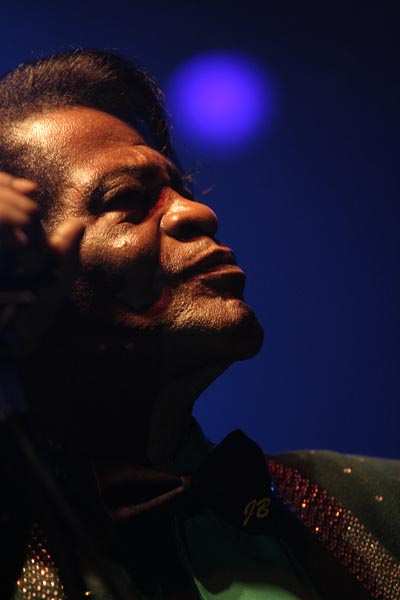
Everybody knows “Say It Loud” and champions it as a song which changed America. Well, that’s not entirely true. Also, everybody knows that James Brown is the progenitor of funk music, but there’s more there than usually noted.
Poltiics and Blues. This is what I’m talking about. First, on a political tip, JB was pushed into “Say It Loud.” The black nation was on the move, burning up—and not just metaphorically. Rap Brown was paying James Brown visits. Brown’s core audience was more militant than it had ever been, so militant that they “encouraged” JB to cut his conk. JB even co-wrote and produced a Hank Ballard song with the lyric: “how you gonna get respect / if you haven’t cut your process yet?” You better believe wearing an afro was a major statement for/from James Brown, a statement he felt compelled to make by the mood of black folk in the late sixties.
“Say It Loud” (by the way, this is a live version from a Dallas, Texas concert) is a contradiction and a paradox. It was cut in Seattle (if I remember correctly—my books are in storage so I can’t check it definitely). In any case, band members were urging JB to do something that spoke directly to the movement, and when JB decided to do it, the band was on the road and typically he wanted to do it when he was moved to do it. They went into the studio and had the idea to use a chorus of children except they couldn’t find enough black kids, so it was actually an integrated children’s chorus shouting “I’m black and I’m proud.”
Isn’t that a gas?
Brown believed in black capitalism. Brown embraced Nixon. In later years he would recognize that “money won’t save you” and cozying up to Tricky Dick was not the best idea in the world.
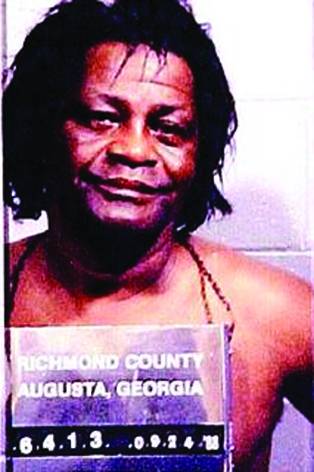
Rather than try to help JB in his later years and offer him administrative support in exchange for his many years of advocating capitalism, the system tried their damnest to bury him. Which is why I don’t care how conservative he often was politically, I will always embrace James Brown because this was one negro the system could never digest. Money issues not withstanding; his white wives and domestic violence woes not withstanding; etc., etc. Whatever one’s particular disinclination to bow down fully on all fours to Mr. Brown, nothing disagreeable he has done outweighs how the system has demonized and attempted to trivialize James Brown.
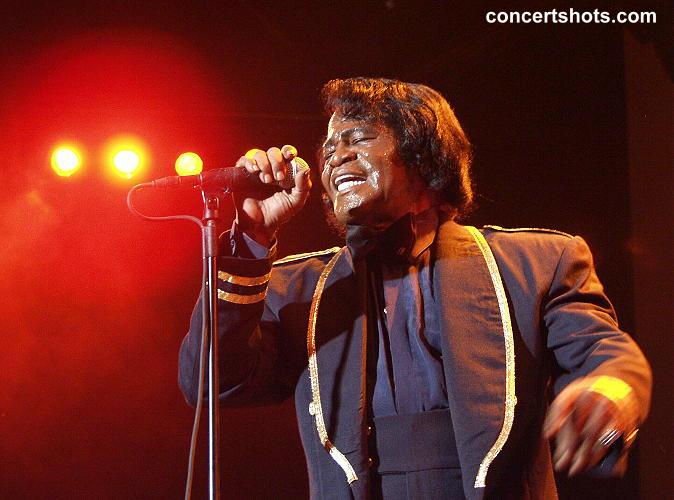
Let’s be clear. While JB’s contributions to American music in general and to rap in particular are incomparable, the fact is, it is the adulation and admiration of the rap audience which has made James Brown immortal and made it impossible for the system to ignore him. Young people in general, and Black youth in particular are the secret ingredient in the worldwide success of James Brown—and you can take that to the bank.
I do not mean to downgrade JB’s musical genius or entertainment expertise, I just mean to acknowledge that our people’s love for James has kept James in the forefront and by “our people” I mean essentially blues people (especially if you understand that rap is just 21st century blues).
Blues power.
Yes, yes y’all. Blues. So we have those four political cuts: “Say It Loud,” “Funky President” (with its funky flutes), "How You Gonna Get Respect" and “I Don’t Want Nobody To Give Me Nothing.” Do y’all realize that Black people in America do not own (not even) one major national media company? No television network, no radio network, no national newspaper. Were it not for the Johnson publishing empire…. Let me stop, I don’t want to go down this road. I’m just saying listen again, and again, to “I Don’t Want Nobody To Give Me Nothing.” Listen and listen hard.
But the other foot, the good foot, was and is the blues. On these three cuts, JB is singing & talking, and playing a mean blues piano. JB like you probably have not heard him before. The blues. The bedrock foundation of African-American music. How foundational? Well, everybody always be pointing to gospel music, but gospel music as we know it is the blues’ outside child.
Kalamu, what are you talking about? I’m saying that gospel music as we know it did not exist until Thomas Dorsey, Mahalia Jackson, and later on some other folk, brought blues elements into the church. Anybody that doesn’t believe this, you need to do some hard study and get beyond mainstream Christian claims. Facts is facts. Check it out.
But again, that is not the subject. Right now we are talking politics and blues. That’s my homage to James Brown.
Politics and blues: How the people moved JB and he in turn moved the people. How he was based in the blues because the blues gave him a way to express his life experiences. How he developed a respect for kujichagulia, i.e. “self-determination,” mainly because didn’t nobody give him nothing. He had to work and work hard.
I guess that’s enough.
(For a more "learned" posting on JB, go to our previous write-ups here and here.)
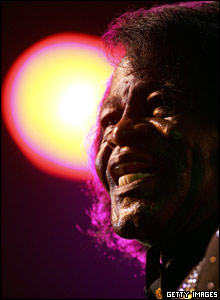
In the cosmic sense, the sense in which we say for example that “Bird Lives,” in that sense, James Brown is not dead, he is just taking a well-deserved rest. R.I.P. JB, R.I.P.
—Kalamu ya Salaam
Believe the hype
Because of scheduling conflicts, I'm having to write this response before I've read Kalamu's post. But I still I have to say a word or two about J.B.
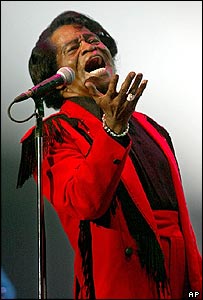
I'm no fan of hyperbole, but when it comes to James Brown, it's actually difficult to overstate his contribution to black American music. He enjoyed one of the longest and most significant careers in the history of R&B. If that wasn't enough, his rhythms are also the cornerstone of a entirely separate genre of music, that being hip-hop. I don't think it overstates the case to say that James Brown is the only musician from outside of hip-hop culture without whom hip-hop could not exist. In other words: no J.B., no rap.
RIP, J.B. You're the man.
—Mtume ya Salaam
This entry was posted on Sunday, December 31st, 2006 at 12:52 am and is filed under Classic. You can follow any responses to this entry through the RSS 2.0 feed. You can leave a response, or trackback from your own site.
4 Responses to “JAMES BROWN / “Like It Is, Like It Was (part 2)””
December 31st, 2006 at 4:38 am
Thanks for the straight up blues pieces by James Brown. Maybe JB should have done more of that. I always thought Bobby Rush was a James Brown with the blues but of course with much more honest country humor. JB was a man filled with enormous contradictions (demons) as well as creative talent and imagination. In a sense I preferred the proto-political James Brown. There was much of the 60s and 70s that he did not digest well. He just did not have the education and intellect to do so. Though he popularized a few Black Power/Black Arts ideas, he also bastardized them for they really did not sink very deep. He turned ideas into popular slogans for the dull masses. And to a degree he became an embarrassment in more ways than one. It’s true, as Kalamu says, he could not be fully digested by the respectable status quo. Overall, Kalamu’s comments are insightful and add greatly to tales about JB. I, however, would like to take issue with his analogy: "I mean . . . rap is just 21st century blues." That is the second time I’ve read this week his analogy of blues and rap. He made it more forcefully in the commentary “HOWLIN’ WOLF, MUDDY WATERS, & BO DIDDLEY.” I generally agree with Kalamu’s views, especially when it comes to music, but . . . Analogies in general are problematical. The blues and rap analogy really stretches the truth of things. Yes, you can find some "similarities" between the two but to say one is the other does violence to the blues and to blues artists. It is like saying a limb is a root; a son or a cousin is the parent. The major difference between the blues and rap is that the blues have a moral/ethical center that cannot be approached by rap lyrics. It is much more grounded in the community, among the people, despite the criticisms of church and other respectable folks. Rap cannot make such claims. Rap possesses minstrelsy, an appeal outside of the community that blues never strove for. Again thanks for the blues pieces by JB. They were new and refreshing. — Rudy
the problem is us, not the form
the real problem is the state of our people not the form of expression. why you think i mentioned the lack of national black media? i believe you are right that "analogies in general are problematical" but the limitations of any analogy does not make the analogy wrong. the blues is a major foundational element of all contemporary black music. period. rap is a blues manifestation, especially given it’s rootedness in the masses, it’s folk poetry of language (those dazzling displays of verbal acrobatics are unmatched in anything else happening in music today, it’s a way with words and with the sound of words that is astounding, if you can hear it). as for the moral/ethical center that’s a whole other discussion that requires us to ask whose/what morals, whose/what ethics. there is no easy answer. the commercialization of rap is both the attraction of it for today’s youth and the destruction of it in terms of what you, Rudy, identify as "minstrelsy." the blues musicians you revere and hold up as examples are the top of the line, we both know there were more than two jokers in the blues deck, there were a bunch of minstrels in the blues, it’s just when we reference, we reference by the best, and if we choose the best of rap, we won’t be talking about the minstrels. thanks for your comments. and, oh yeah, one more thing, i prefer the blues-based/funk-based jb, which is to say, i prefer all of pre-eighties jb, because afterwards he became just the sort of minstrel that you characterize and chastise rappers about. we may not want to see it, but who refers to jb’s post "living in america" as great recordings?
—kalamu
January 1st, 2007 at 8:53 am
James Brown was my hero. Thru his music, messages, and GOD given talent, he greatly influenced my life. I remember as kids, my friends and I would spend hours together trying to imitate James Brown’s singing and dance steps. At one time, we even wore the “Revolution of the Mind” hairstyle.
Now GOD has James Brown in Heaven. You know James Brown is putting on his show.
I have all of his music except one: “World.” It was released on 45rpm in the early 70’s.
We love amd miss you James Brown.
RIP GODFATHER OF SOUL.
January 1st, 2007 at 11:14 pm
Thanks so much for this.
A week of reading all these white music sites ‘honoring’ JB without a lick of context was making my head hurt. All of them so angry at hiphop (and by extension, us) that they claim with a straight face that rap musicians benefited from Brown, but not the other way around. Rest well, Godfather.
Happy 2007 Breath of Life!
January 4th, 2007 at 8:50 pm
Kalamu–to use the parlance of the younger heads, “really feelin'” your last comment (“the problem is us, not the form”).
Hard to grasp all that James Brown has meant to music–rhythmically, stylistically. I think what moves me about him is that he is/was unapologetically himself. Everything from the tight suits, perms and dancing to the lyrics (how many of us yearned in our bones to hear something like “Say It Loud…”? How many of us would have had the courage to say it ourselves?) was his own self. How much of our culture, ourselves can we, as individuals or collectively “keep”–not have it co-opted or made light of by the mainstream? James Brown could not be imitated(except when filtered through his progeny, Michael Jackson, Usher, Chris Brown, et al), was just too damn much to be absorbed into the mainstream, as alluded to by others here.
The t.v. commentaries and accolades were indeed mystifying. As if, in death, these folks were trying to defuse J.B. of his race, his roots, his culture his very essence–something they couldn’t do in life, “Blues Brothers” and “Rocky” movies be damned.
As an aside, I thought that the exchange on The Roots a couple weeks back was some of the most thought-provoking stuff I’ve read on this site.
The single “Don’t Feel Right” is a sterling example of what Kalamu referred to “astounding” in hip-hop. But this notion–how what we do gets co-opted, watered down, twisted up–you all have touched on it before–Mtume’s insights on the record business have been so informative, if disillusioning to us not in-the-know. But The Roots single, it brings to mind–have y’all considered a section on Kool & The Gang? Next to J.B., one of the most heavily-sampled artists in hip-hop’s history. And what perplexes me–what happens that a group goes from writing what turn out to be bedrocks of the hip-hop canon–“Jungle Boogie,” “Hollywood Swingin'” and the hypnotic “Summer Madness,” end up at “Celebration” and “Joanna”??? I’m guessin’ $$$ is the easy answer but there’s got to be something else at work here–something gradual and sneaky and scary.
Leave a Reply
| top |